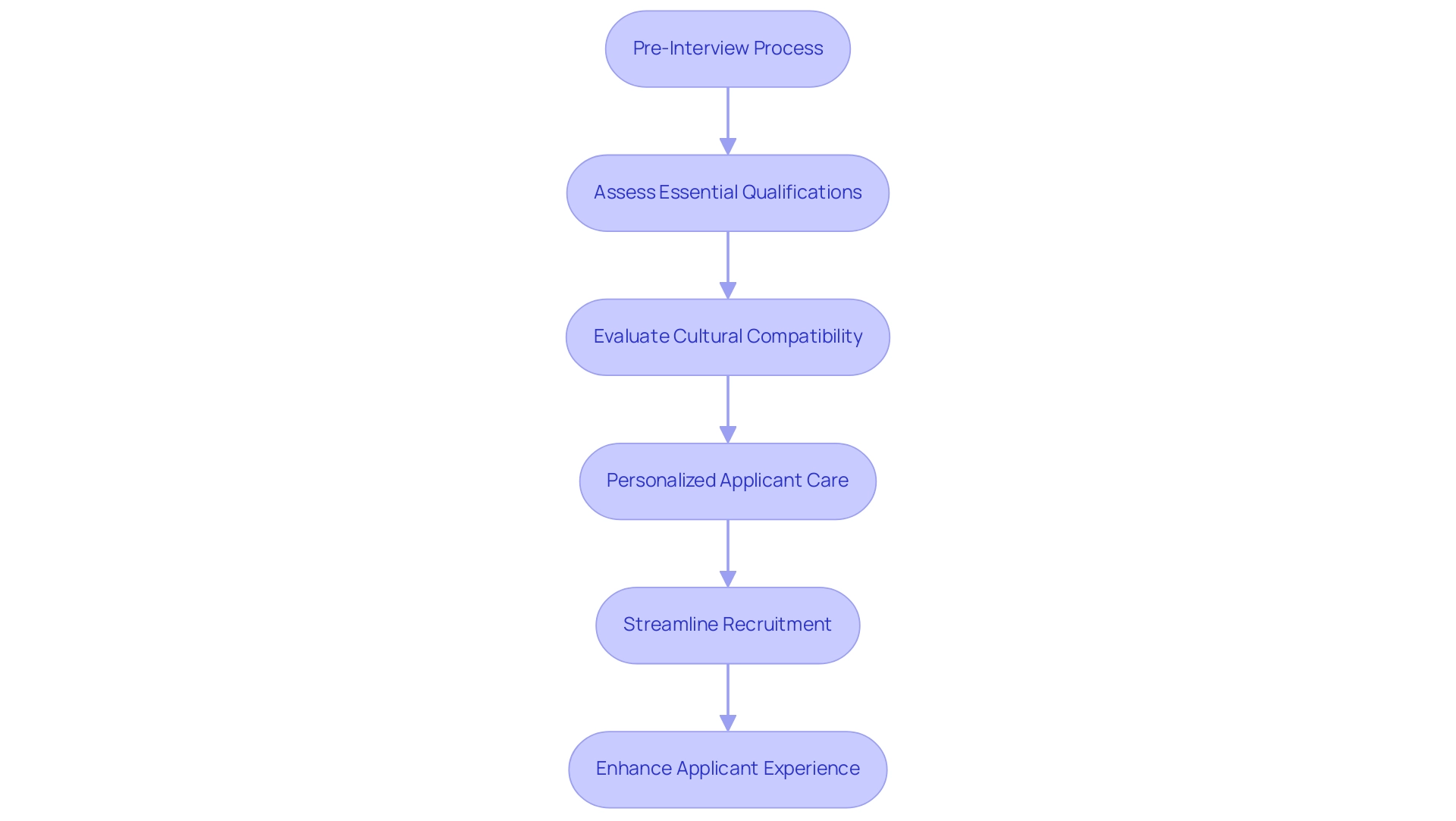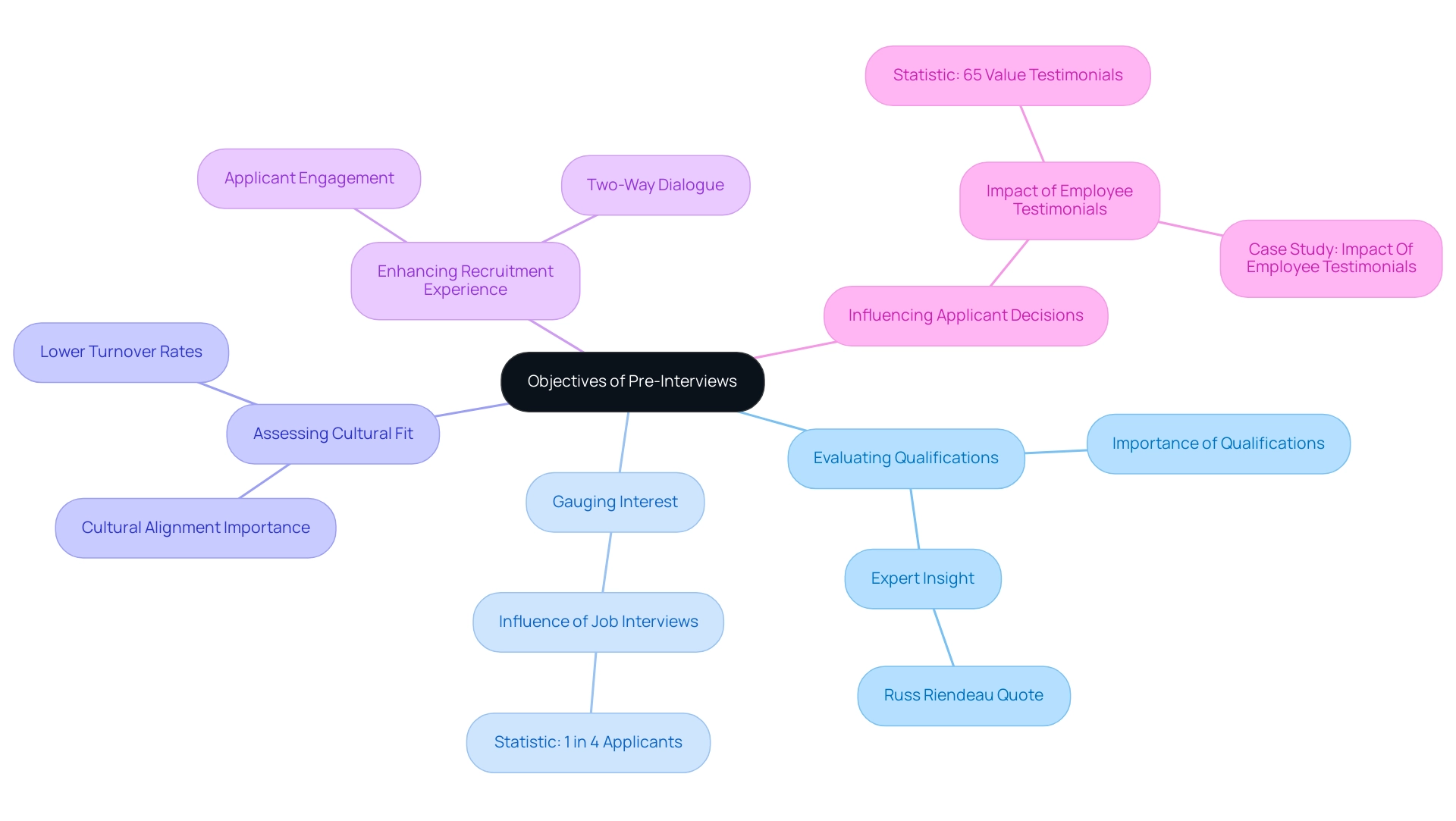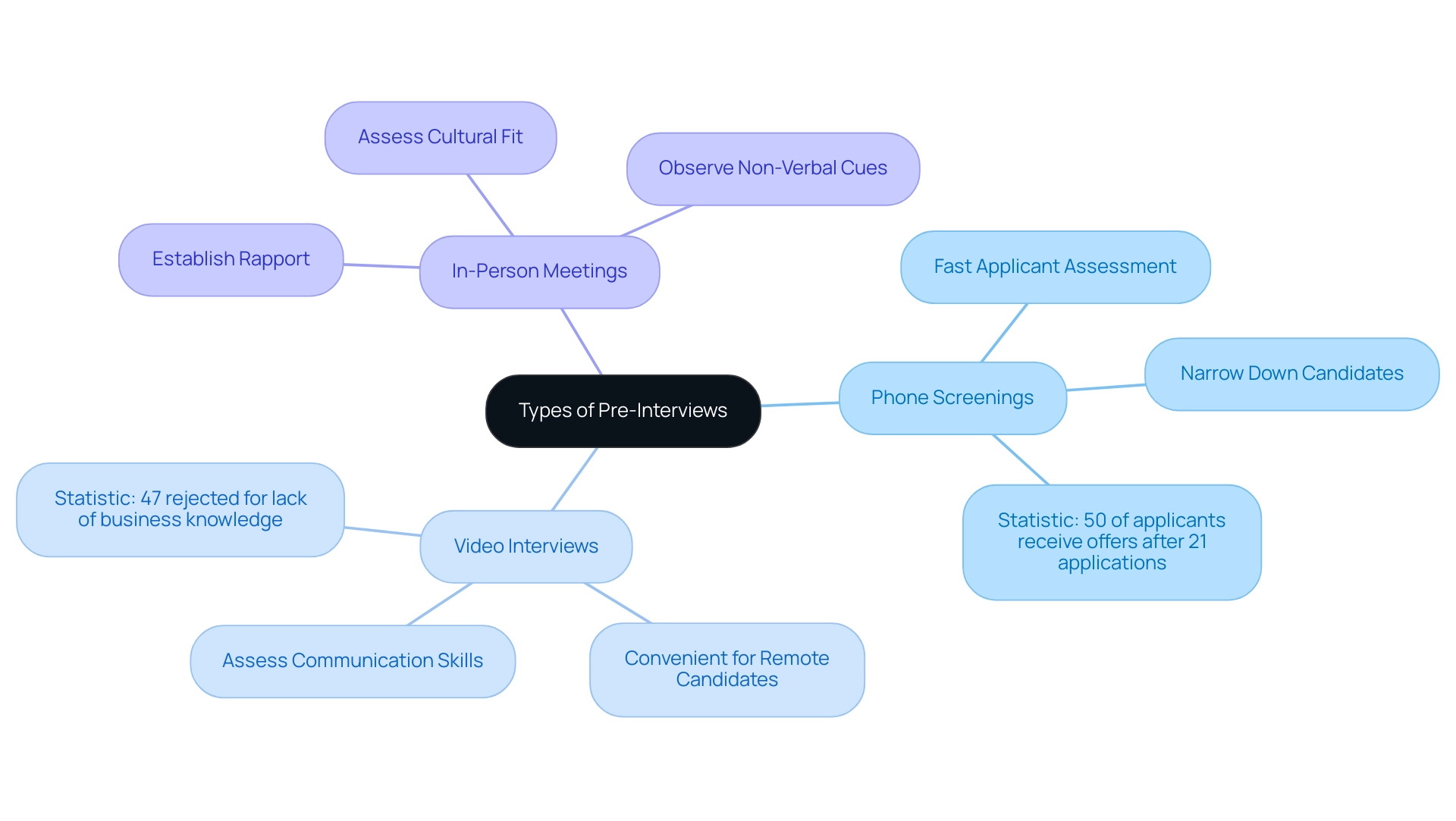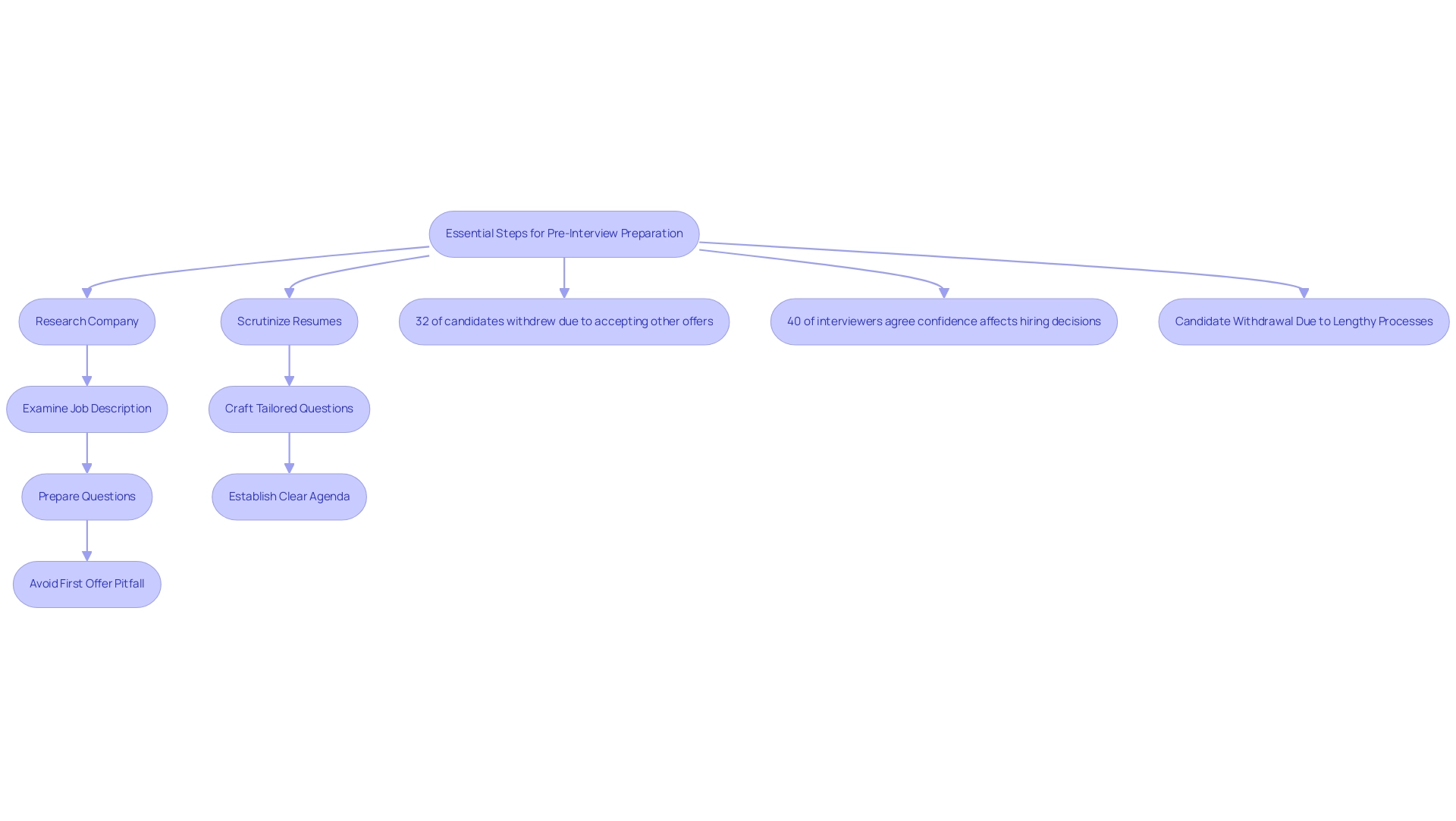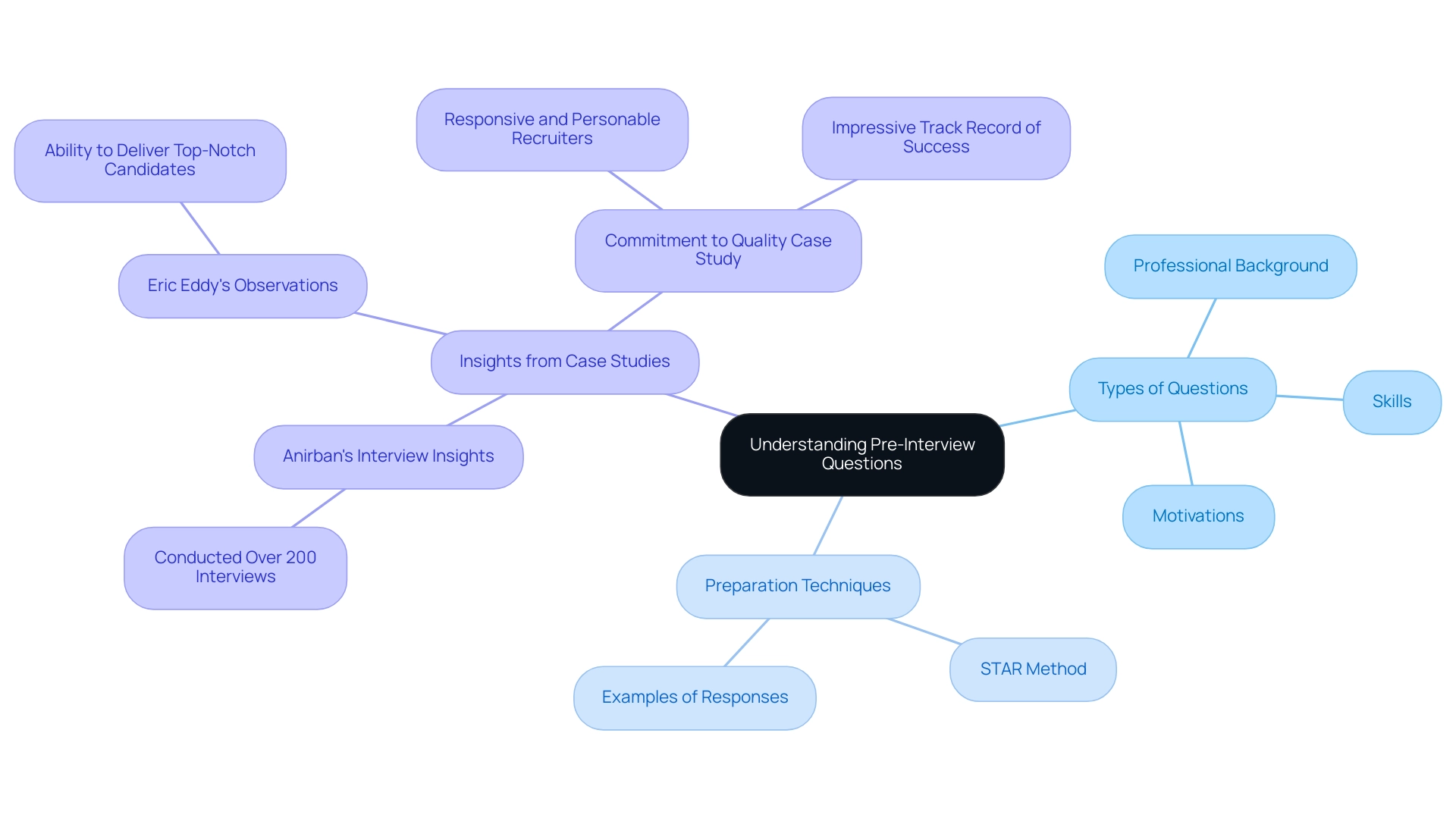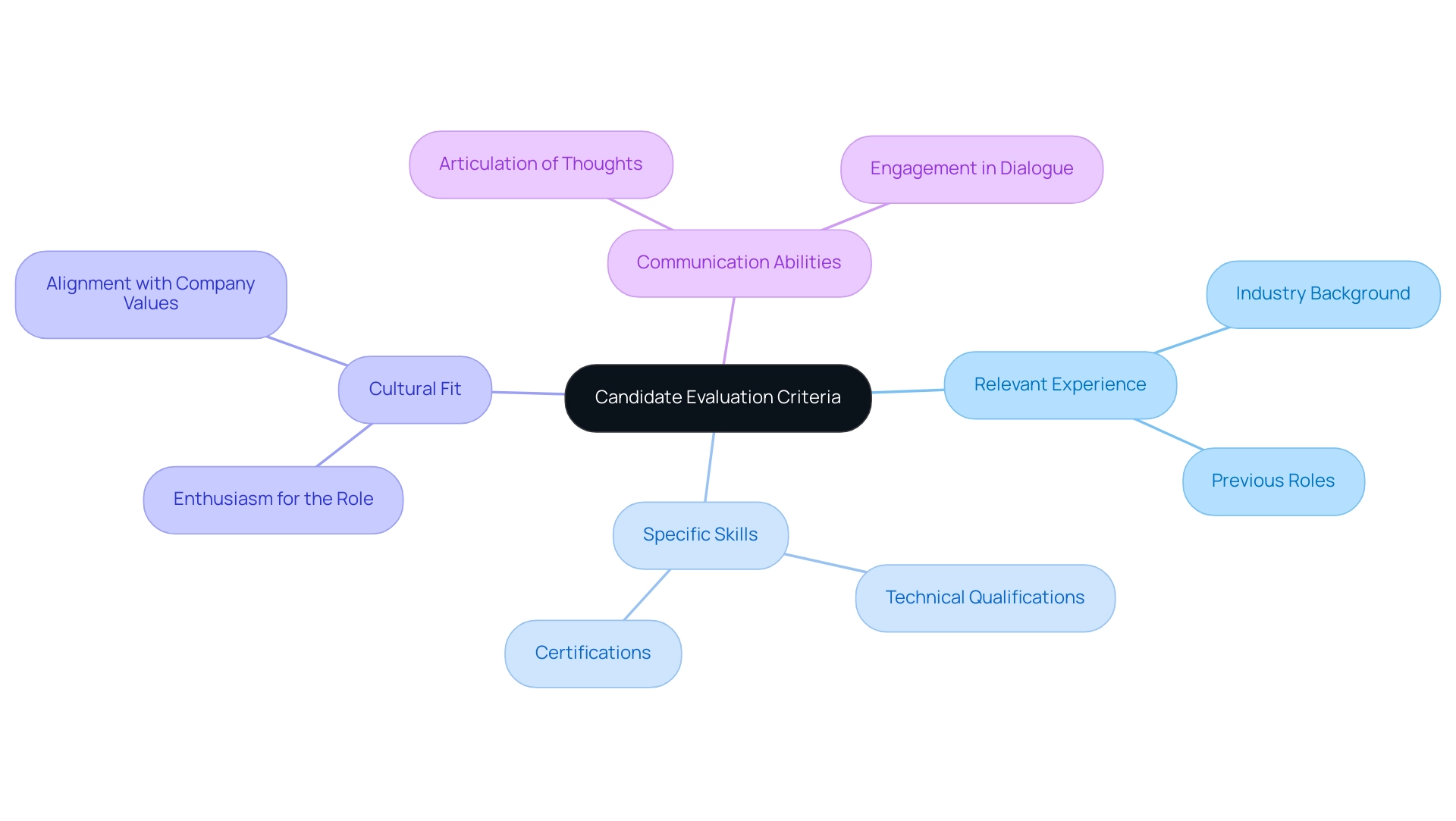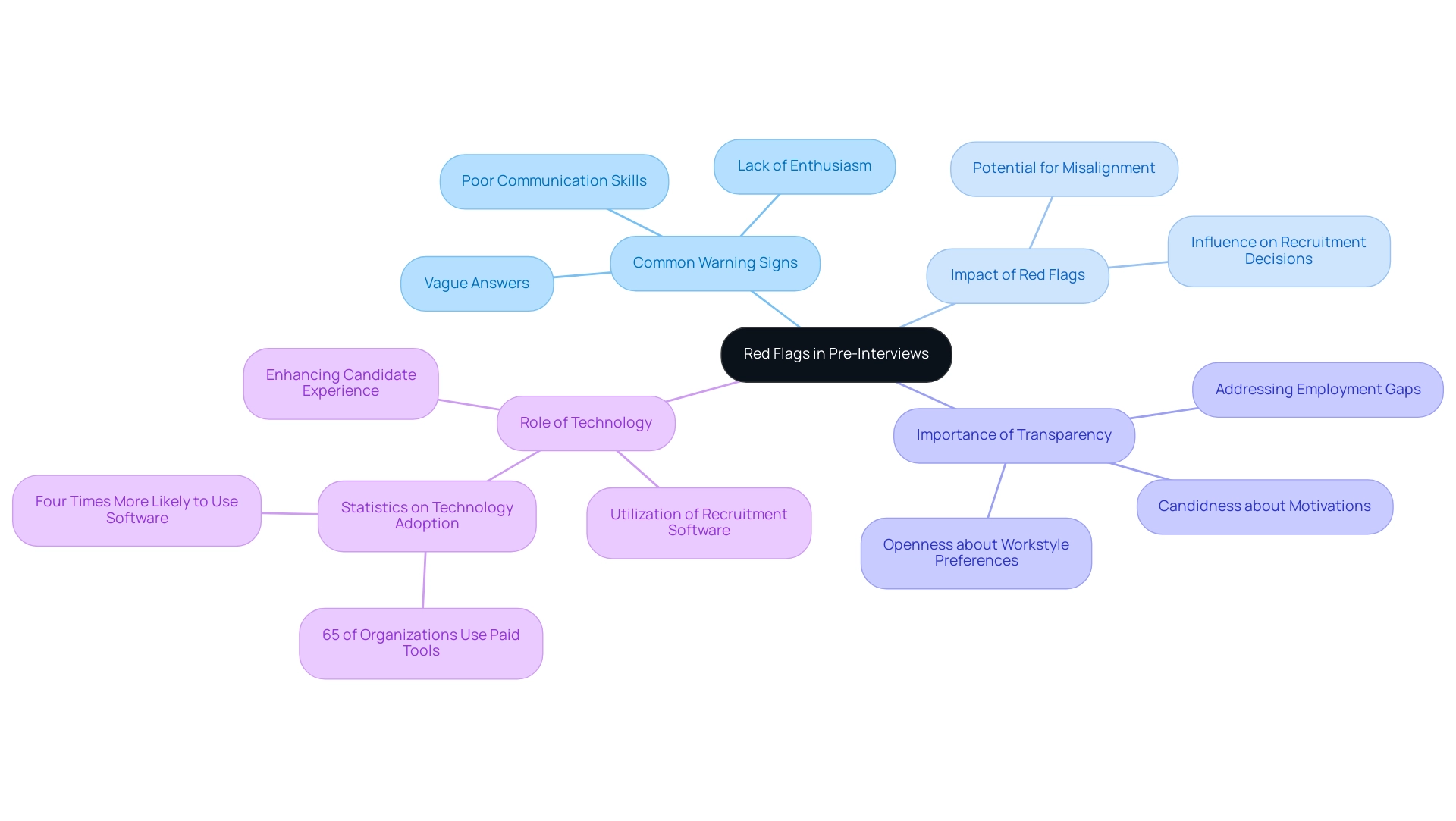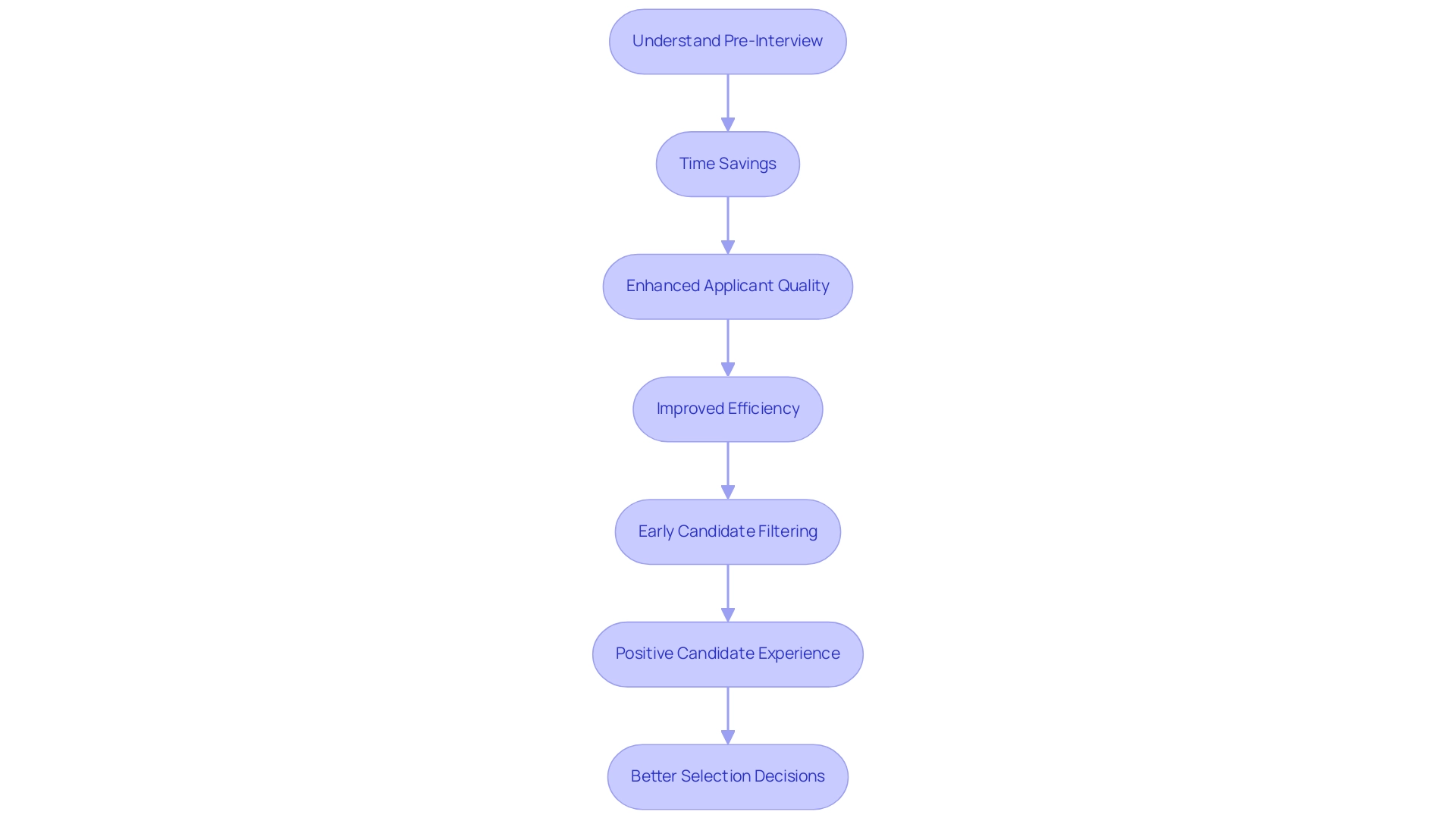Overview
Pre-interviews serve as vital preliminary conversations designed to assess candidates’ qualifications and cultural fit. This strategic approach streamlines the recruitment process by identifying promising applicants at an early stage. Notably, this initial step not only conserves time and resources for employers but also significantly enhances the candidate experience. By fostering transparency and engagement, pre-interviews lead to more informed hiring decisions. In an industry where recruitment challenges are prevalent, implementing pre-interviews can be a transformative solution. Employers are encouraged to adopt this practice to elevate their hiring processes and ensure they attract the best talent.
Key Highlights:
- Pre-interviews are preliminary conversations assessing qualifications and cultural fit, streamlining the recruitment process.
- Only 20% of applicants receive interview invitations, making pre-interviews vital for identifying promising candidates.
- 61% of candidates prefer transparency about compensation, which can be discussed during pre-interviews.
- Cultural fit is crucial for long-term success, with 65% of applicants influenced by employee testimonials.
- Pre-interviews can take various forms, including phone screenings, video interviews, and in-person meetings, each offering unique advantages.
- Effective preparation for pre-interviews involves researching the company and crafting insightful questions.
- Key evaluation criteria during pre-interviews include relevant experience, specific skills, cultural fit, and communication abilities.
- Common red flags in candidates include vague answers, lack of enthusiasm, and poor communication skills.
- Pre-interviews save time and enhance applicant quality, leading to more informed hiring decisions.
- Organizations that implement structured pre-interviews report better recruitment outcomes and improved experiences for candidates.
Introduction
In the competitive landscape of talent acquisition, pre-interviews have emerged as a pivotal element in the hiring process. They serve as both a filter and a bridge between candidates and employers. Have you considered how these preliminary conversations not only assess a candidate’s qualifications but also gauge their cultural fit? This ensures that organizations invest their resources wisely in the most promising applicants. As companies grapple with the complexities of recruitment, understanding the nuances of pre-interviews can lead to more informed hiring decisions and a significantly enhanced candidate experience. By examining the various formats, objectives, and evaluation criteria of pre-interviews, organizations can refine their approach and ultimately secure the right talent for their teams.
Defining the Pre-Interview: Purpose and Importance
What is a pre-interview? It is an essential preliminary conversation that occurs before the formal interview. Its main goal is to assess an applicant’s essential qualifications and cultural compatibility for the position, allowing recruiters like Amanda at Boutique Recruiting to effectively sift out unqualified individuals early in the recruitment process. Amanda’s dedication to personalized applicant care ensures that this initial step is vital for streamlining the recruitment process, ultimately saving valuable time and resources for both employers and applicants alike.
Understanding what a pre-interview entails can significantly enhance hiring efficiency and improve the overall applicant experience. According to industry insights, only 20% of applicants receive an interview invitation, underscoring the importance of pre-interviews in identifying the most promising individuals. Furthermore, statistics reveal that 61% of candidates prefer transparency regarding compensation in job descriptions, indicating that pre-interviews can also serve as a platform for discussing expectations and aligning interests.
Expert opinions reinforce the value of pre-interviews in recruitment. As noted by career strategist Pleas Andrew Honeywood, “Sometimes, an interviewer will talk to a dozen people who have the minimum core baseline skills. So the hiring decision will come down to who the interviewer ‘likes more’ and feels would be a better cultural fit.”
This highlights how the initial impression made during these conversations can heavily influence the overall interview process. This is especially pertinent in a competitive job market where 118 individuals apply for each position on average, and applicants typically undergo 2-3 interviews before obtaining an offer.
Amanda’s approach to recruitment emphasizes the importance of building relationships with applicants, making them feel calm, understood, and confident before interviewing directly with a client. This personalized touch not only enhances the applicant experience but also aligns with the strategic goals of Boutique Recruiting in navigating the talent war.
Case studies illustrate the impact of pre-interviews on recruitment success. For instance, in light of the ongoing talent crunch, individuals who engage in upskilling through industry-recognized e-learning courses are better positioned to meet the evolving needs of recruiters. This proactive approach not only enhances their employability but also aligns with the expectations set during pre-interviews, fostering a more efficient recruitment.
Moreover, it is important to note that only 7% of applicants receive a phone call about a rejection, which emphasizes the need for personal communication in the recruitment process. This aligns with Amanda’s commitment to enhancing applicant experience, as effective communication can demonstrate that the company values their effort.
Understanding what a pre-interview reveals advantages that go beyond applicant evaluation; they also aid in enhancing recruitment strategies. By incorporating pre-interviews, employers can ensure that they are investing their time in applicants who not only possess the necessary skills but also align with the company culture. This strategic approach is increasingly important in 2025, as the demand for qualified professionals continues to rise, with an expected annual job growth of 28% by 2026.
In summary, pre-interviews play a crucial role in enhancing recruitment efficiency, allowing organizations to make informed selection decisions while providing applicants with a positive experience. By leveraging this preliminary step, employers can significantly improve their chances of finding the right talent in a competitive landscape.
Objectives of Pre-Interviews: Why They Matter
What constitutes a pre-interview? Its objectives are multifaceted, concentrating on evaluating an applicant’s qualifications, gauging their interest in the position, and assessing their cultural fit within the organization. Research indicates that 65% of applicants consider employee testimonials and reviews as influential factors when evaluating a company, underscoring the significance of cultural alignment in hiring decisions. This is further supported by the case study titled ‘Impact Of Employee Testimonials,’ which demonstrates that leveraging employee testimonials can significantly influence an applicant’s decision to apply.
By clarifying these objectives, recruiters can tailor their questions and approach to gather pertinent information that aligns with the company’s needs. Pre-interviews also provide applicants with a platform to learn more about the role and the organization, fostering a two-way dialogue that enhances the overall recruitment experience. This interaction is crucial; one in four job applicants report that job interviews significantly influence their decision to accept a job offer. Therefore, a pre-interview serves not only as a preliminary assessment tool but also as a means to engage applicants effectively.
Furthermore, assessing cultural fit during pre-interviews is essential for long-term success. It enables recruiters to determine whether applicants will thrive within the company’s environment, leading to higher retention rates and enhanced job satisfaction. By employing targeted questions that explore applicants’ values and work styles, recruiters can gain insights into how well individuals align with the organizational culture.
Research indicates that organizations prioritizing cultural fit often experience lower turnover rates and higher employee satisfaction. At Boutique Recruiting, our dedication to tailored recruitment is evident in the experiences of those we assist. For instance, Magaly B. praised Erika for her supportive guidance, stating, “Thanks for believing in me and helping me not short change myself.” Similarly, Doug B. highlighted the excellent communication and professionalism he experienced, noting, “Very impressed with Boutique Recruiting! Thank you!” These testimonials underscore the importance of transparency and authenticity in the recruitment process, as candidates like Zeb K. and Isabelle D. found that being open about their goals and preferences led to successful job placements.
Incorporating expert insights, it is noted that the lack of interview training for recruitment managers has historically undermined effective recruitment strategies. As Russ Riendeau, senior partner and chief behavioral scientist with New Frontier Search Company, states, “The lack of interview training for managers in America has been the number-one assassin of great business strategic plans over the past 35 years or more, yet rarely discussed as a critical missing piece.” This highlights the importance of organized pre-interviews that clarify what a pre-interview entails, emphasizing both qualifications and cultural alignment, ultimately enhancing applicant evaluation and selection methods.
By leveraging these objectives, organizations can improve their recruitment processes and secure individuals who are not only qualified but also a great fit for their teams.
Types of Pre-Interviews: Exploring Different Formats
What constitutes a pre-interview? It serves as a pivotal step in the recruitment process, manifesting in various formats such as phone screenings, video interviews, and in-person meetings. Each format offers unique advantages tailored to specific hiring needs, particularly in the ongoing competition for top talent, where candidates are increasingly selective about their job options.
-
Phone Screenings: This format stands out as the most prevalent pre-interview method, enabling recruiters at Boutique Recruiting to effectively assess an applicant’s qualifications and interest in the position. It excels in swiftly narrowing down a vast pool of applicants. Notably, statistics reveal that just over half of job applicants secure a job offer after submitting up to 21 applications, while 27.2% of job seekers receive an offer after submitting up to 10 applications. This underscores the critical role of effective pre-screening—essentially what defines a pre-interview—in identifying suitable candidates early in the process, especially as discerning and resourceful applicants actively evaluate potential employers at this stage.
-
Video Interviews: Gaining momentum in recent years, video interviews present a convenient avenue for connecting with remote candidates. They allow recruiters at Boutique Recruiting to assess not only the applicant’s qualifications but also their communication skills and demeanor in a virtual environment. This format has proven effective, particularly as 47% of applicants are rejected post-interview for lacking adequate business knowledge, highlighting the significance of pre-interview assessments. In a competitive landscape, ensuring that hiring managers conduct these interviews smoothly is vital to securing top talent.
-
In-Person Meetings: For local candidates, in-person pre-interviews are invaluable for establishing rapport and assessing cultural fit. This format enables recruiters to observe non-verbal cues and engage in more dynamic discussions, yielding deeper insights into the individual’s personality and alignment with the company culture. As candidates become increasingly selective, grasping the essence of a pre-interview is crucial for crafting a positive interview experience that attracts the right talent.
By 2025, the effectiveness of these pre-interview formats continues to evolve, with companies increasingly embracing structured approaches to refine their interviewing strategies. Implementing best practices—such as fostering a comfortable environment and allowing candidates to express themselves freely—can lead to more meaningful interactions. Success stories from organizations that have adopted structured phone screenings and video interviews reveal that these methods not only streamline the hiring process but also enhance the quality of candidate selection.
As Eric Eddy observed, the firm’s capability to deliver top-tier candidates swiftly and efficiently is essential in this competitive environment.
Ultimately, comprehending the essence of a pre-interview can inform the decision-making process between phone screenings and video interviews, tailored to the specific requirements of the role and the organizational context. Each format possesses its strengths, and recognizing their benefits can significantly enhance recruitment efforts. Furthermore, as highlighted by Marija Lazic, 77% of recruiters regard grammatical errors and typos as dealbreakers, emphasizing the importance of thoroughness prior to the interview.
The case study titled ‘Best Strategies for Conducting Interviews’ illustrates that effective interviewing is paramount for identifying the right candidate, with structured approaches yielding more meaningful and insightful interviews. Candidates are not only evaluating their fit for the role but also assessing whether Boutique Recruiting aligns with their career aspirations.
Preparing for a Pre-Interview: Essential Steps for Success
Understanding what constitutes a pre-interview is essential for both applicants and recruiters, involving several critical steps that can significantly influence the hiring process. Candidates should commence by conducting thorough research on the company, which encompasses grasping its culture, values, and recent developments. This understanding empowers them to tailor their responses effectively, demonstrating a genuine interest in the organization.
Furthermore, a meticulous examination of the job description aids applicants in aligning their skills and experiences with the specific requirements of the role. It is vital for candidates to recognize that the first job offer may not necessarily be the best; exploring multiple opportunities can unveil roles that better correspond with their long-term career aspirations.
Moreover, applicants should devise insightful questions to pose to the interviewer, showcasing their engagement and enthusiasm for the position. This proactive strategy not only reflects positively on the applicant but also cultivates a more dynamic dialogue about what a pre-interview entails. Candidates must avoid the pitfall of accepting the first offer out of mere convenience, as this may lead to regret if it does not align with their career objectives.
On the recruiter’s end, preparation holds equal significance. Recruiters should meticulously scrutinize applicant resumes to pinpoint key experiences and skills that align with the job requirements. Crafting a list of pertinent questions tailored for each individual can facilitate a more focused and effective discussion.
Establishing a clear agenda is paramount in elucidating what a pre-interview involves, ensuring that all necessary topics are addressed, thus making the session both productive and informative.
Statistics reveal that 32% of North American applicants who exited the recruitment process did so because they accepted offers from other companies, often due to protracted interview durations. This underscores the necessity for recruiters to optimize their processes and expedite selection decisions to sustain applicant interest. The case study titled “Withdrawal Due to Lengthy Processes” reinforces this notion, illustrating that organizations are urged to accelerate their interview processes to maintain applicant engagement.
Additionally, 40% of interviewers concur that an applicant’s overall confidence significantly sways hiring decisions, highlighting the importance of thorough preparation for both parties. As Eric Eddy noted, the firm’s ability to deliver exceptional individuals promptly and effectively underscores the value of comprehensive preparation.
What exactly is a pre-interview? By ensuring that both applicants and recruiters are well-prepared, it can evolve into a valuable opportunity for mutual evaluation, ultimately enhancing the overall applicant journey and reinforcing the employer brand. Furthermore, optimizing the onboarding process can further elevate the applicant journey and strengthen the employer brand, rendering preparation a vital component of successful recruitment.
Common Pre-Interview Questions: What to Expect
Common inquiries about what constitutes a pre-interview primarily focus on an applicant’s professional background, skills, and motivations for applying. Questions such as ‘Can you describe your pertinent background?’ and ‘What interests you about this position?’ serve to evaluate both qualifications and cultural fit within the organization. Applicants must also be prepared to articulate their career aspirations and how these align with the company’s goals, demonstrating a proactive approach to their professional development.
To effectively answer these pre-interview questions, applicants can utilize the STAR method (Situation, Task, Action, Result) to structure their responses. This technique not only provides clarity but also showcases their problem-solving abilities and achievements in previous roles. For instance, when inquired about relevant experience, an individual might describe a specific project where they successfully led a team to meet a tight deadline, highlighting their leadership and organizational skills.
Understanding what a pre-interview entails and anticipating common questions can significantly boost an individual’s confidence and performance. Research indicates that those who prepare for these inquiries tend to achieve higher response rates and more favorable outcomes during the interview process. Furthermore, recognizing how these questions assess qualifications allows individuals to tailor their responses effectively, ensuring they highlight the most pertinent aspects of their background.
In practice, case studies reveal that individuals who engage with pre-interview questions thoughtfully often leave a lasting impression on hiring managers. For example, an applicant who eloquently links their previous roles with the company’s mission not only showcases their qualifications but also their sincere interest in the position. This alignment is crucial, as it reflects the applicant’s potential to integrate seamlessly into the company culture—a key factor emphasized by Boutique Recruiting in its tailored approach to recruitment.
Moreover, with Anirban having conducted over 200 interviews across different levels, the insights gained from these experiences can help individuals understand what a pre-interview involves and provide valuable guidance for their interview preparations. As Eric Eddy observed, Boutique Recruiting has a proven ability to deliver top-notch talent quickly and efficiently, underscoring the effectiveness of their recruitment strategies. The firm’s dedication to quality, as demonstrated in the case study titled ‘Commitment to Quality,’ emphasizes how their responsive and personable recruiters guarantee that employers receive only the most qualified individuals for their open positions.
This dedication not only improves the hiring process but also strengthens the significance of aligning individuals’ experiences with the company’s mission, further solidifying Boutique Recruiting’s unique value proposition in the recruitment landscape. Additionally, applicants should remember that the first job offer may not always be the best, and exploring multiple opportunities can lead to roles that better align with their long-term career goals and aspirations.
Evaluating Candidates: Criteria Used in Pre-Interviews
A pre-interview involves assessing applicants using a variety of criteria that play a crucial role in determining their suitability for a position. Key factors include:
- Relevant experience
- Specific skills
- Cultural fit
- Communication abilities
Recruiters at Boutique Recruiting, like Amanda, who is deeply committed to personalized applicant care, also evaluate an individual’s enthusiasm for the role and how well they align with the company’s core values.
Amanda’s journey reflects a dedication to building relationships with applicants, ensuring they feel calm and confident before interviews. This is essential for establishing a supportive environment.
Establishing clear evaluation criteria is vital for ensuring a fair and consistent assessment process, ultimately leading to more informed hiring decisions. Statistics reveal that 20% of individuals who interview successfully secure a job, underscoring the importance of effectively showcasing one’s qualifications during this stage. Boutique Recruiting’s personalized approach enhances these odds for applicants, as their tailored services focus on understanding the unique needs of both employers and applicants.
This commitment is reflected in the 5-star reviews from clients who value the team’s ability to deliver quality professionals quickly and efficiently.
Moreover, a favorable interview situation greatly impacts applicant behavior; studies show that 95% of individuals would reapply if they had a positive interaction during their first engagement with a company. This corresponds with Boutique Recruiting’s commitment to offering a supportive and engaging applicant journey, reinforcing their reputation as a reliable ally in the recruitment process. Testimonials from applicants highlight how the Boutique Recruiting team, including Amanda, goes the extra mile to ensure individuals feel valued and understood throughout the hiring journey.
For example, one applicant remarked, “I couldn’t ask for a better employee and experience, thank you Boutique Recruiting!”
To enhance their chances of success, applicants should tailor their responses to emphasize their strengths in these critical areas. For instance, demonstrating strong communication skills can set an applicant apart, especially when considering what a pre-interview entails, as these abilities are often a focal point. Recruiters assess candidates not only on their technical qualifications but also on how well they can articulate their thoughts and engage in meaningful dialogue.
Cultural fit is another vital aspect of the evaluation process. Companies increasingly acknowledge that employing individuals who resonate with their organizational culture leads to better team dynamics and overall performance. In fact, 71% of companies now offer inclusive feedback to applicants, fostering growth regardless of the hiring outcome.
Boutique Recruiting aligns with this trend by ensuring that individuals receive constructive feedback, which contributes to their development and future applications. This highlights the importance of individuals demonstrating their cultural alignment during the process of what a pre-interview entails, which can be achieved by researching the company’s values and reflecting them in their responses.
Ultimately, understanding what a pre-interview involves through a well-rounded approach, focusing on these evaluation criteria, can significantly enhance the likelihood of a successful placement for both applicants and employers alike. Insights from case studies, such as Boutique Recruiting’s emphasis on personalized service and the positive impact of reapplication rates, further illustrate the effectiveness of their methods in fostering successful hiring outcomes.
Red Flags in Pre-Interviews: What to Watch Out For
Identifying red flags during the pre-interview phase is crucial for the effective assessment of applicants. Common warning signs include:
- Vague or inconsistent answers
- A noticeable lack of enthusiasm
- Poor communication skills
For instance, candidates who struggle to articulate their experiences or appear unprepared may raise significant concerns regarding their suitability for the role.
Statistics indicate that 54% of HR specialists report that employees leave in pursuit of career advancement opportunities. This underscores the importance of identifying individuals who not only meet technical criteria but also demonstrate a genuine interest in their professional development.
Moreover, candidates should embrace openness during the interview process. Being forthcoming about workstyle preferences, salary expectations, and unique personal circumstances can significantly enhance the evaluation process. For example, if an applicant strongly prefers remote work, they should clearly articulate the importance of this arrangement and outline their strategies for ensuring effective communication and collaboration.
This level of honesty fosters trust and enables managers to assess candidates’ suitability more accurately. Candidates should also be candid about their motivations for seeking new employment, such as career growth, a desire for new challenges, or a change in their work environment, and they must address any employment history gaps truthfully.
Recruiters must be vigilant in recognizing these red flags, as they can significantly influence recruitment decisions. A study revealed that organizations excelling in talent acquisition are four times more likely to utilize software to manage their recruitment pipeline, highlighting the critical role of technology in modern recruitment. This technological adoption allows recruiters to streamline processes and focus on individuals who exhibit strong communication skills and enthusiasm.
In fact, 65% of organizations utilize paid recruiting tools, which can enhance the effectiveness of the recruitment process.
Expert opinions suggest that unclear responses can adversely affect applicant evaluations. When candidates provide vague answers, it may indicate a lack of understanding regarding their backgrounds or the positions they seek, leading to doubts about their ability to perform effectively in the role.
Therefore, both recruiters and applicants should approach the pre-interview phase with a critical eye, ensuring that the evaluation process is thorough and insightful.
In summary, being aware of red flags such as vague answers, lack of enthusiasm, and poor communication skills can empower recruiters to make informed decisions about which candidates to advance in the hiring process. By maintaining clear communication and utilizing efficient technology, organizations like Boutique Recruiting can enhance the applicant journey and ultimately secure the best talent available. As Eric Eddy observed, the firm’s ability to provide top-notch individuals swiftly and effectively is crucial in today’s competitive environment, and integrating experience statistics into recruitment strategies is essential for remaining competitive in 2024.
Benefits of Pre-Interviews: Enhancing the Hiring Process
Understanding what constitutes a pre-interview in the recruitment process offers numerous advantages, including significant time savings, enhanced applicant quality, and increased overall efficiency in recruitment. By grasping the concept of a pre-interview, organizations can effectively filter candidates at an early stage, concentrating their resources on the most promising individuals. This strategic approach not only streamlines the recruitment process but also leads to more informed selection decisions, a necessity in today’s competitive talent landscape.
Moreover, recognizing the significance of a pre-interview provides candidates with a valuable opportunity to gain insights into company culture and specific role expectations, thereby fostering a positive candidate experience. This initial interaction is pivotal; career experts emphasize that first impressions heavily influence the overall interview process. As Pleas Andrew Honeywood, a job coach and career content strategist, notes, the hiring decision often hinges on cultural fit and personal rapport. Therefore, understanding what a pre-interview entails is a critical step in establishing that connection.
Candidates are also vigilant for potential red flags during these interactions, which can significantly impact their perception of the organization. Statistics indicate that 38% of employers believe the time spent on job seekers could have been utilized more productively elsewhere. By integrating pre-interviews, companies can mitigate this inefficiency, ensuring that only the most suitable individuals progress to subsequent interview stages. Furthermore, applicants typically undergo 2-3 interviews to secure a job offer, raising the question of how a pre-interview minimizes the total time and resources invested in recruitment.
Case studies reveal that organizations implementing structured pre-interviews and talent evaluations report better recruitment outcomes and improved applicant experiences, reinforcing the effectiveness of this approach. Understanding what a pre-interview entails highlights that its benefits extend beyond mere time savings; they also contribute to a more efficient recruitment process. Pre-interviews empower HR specialists to assess applicants’ qualifications and compatibility early on, enhancing recruitment efficiency and ultimately leading to superior selection decisions.
Boutique Recruiting specializes in tailored recruitment solutions for niche legal positions, executing custom searches that align with specific company needs, industry demands, and geographic location. This impressive track record of satisfied clients and candidates underscores its reputation as a trusted recruiting partner. For more information on how Boutique Recruiting can assist you with tailored recruitment solutions, please contact us. Embracing the concept of a pre-interview is a best practice that can significantly elevate the quality of hires and streamline the overall hiring process.
Conclusion
Implementing pre-interviews in the hiring process is not merely a strategic advantage; it is essential for enhancing recruitment efficiency and optimizing the candidate experience. By serving as a preliminary filter, pre-interviews allow recruiters to assess qualifications, cultural fit, and overall enthusiasm from candidates before advancing them to formal interviews. This proactive approach saves valuable time and resources for both employers and candidates, ultimately leading to more informed hiring decisions.
Moreover, pre-interviews provide candidates with an opportunity to engage in meaningful dialogue about their aspirations and the company’s culture. This two-way communication fosters transparency, enabling candidates to better understand the role while allowing recruiters to gauge interest and alignment with organizational values. The effectiveness of pre-interviews can significantly influence both candidate selection and retention rates, reinforcing the importance of cultural fit in today’s competitive job market.
In conclusion, the incorporation of pre-interviews is a best practice that organizations should embrace to navigate the complexities of talent acquisition. By refining their recruitment strategies to include this critical step, employers can enhance their chances of finding the right talent while creating a positive candidate experience. Ultimately, focusing on personalized interactions and clear evaluation criteria during pre-interviews can lead to successful placements that benefit both candidates and companies alike.
Frequently Asked Questions
What is a pre-interview?
A pre-interview is a preliminary conversation that occurs before the formal interview, aimed at assessing an applicant’s essential qualifications and cultural compatibility for the position.
Why are pre-interviews important in the recruitment process?
Pre-interviews help recruiters identify unqualified candidates early, streamline the recruitment process, and enhance the overall applicant experience, ultimately saving time and resources for both employers and applicants.
What percentage of applicants receive an interview invitation?
Only 20% of applicants receive an interview invitation, highlighting the significance of pre-interviews in identifying promising candidates.
How do pre-interviews facilitate discussions about compensation?
Pre-interviews provide a platform for discussing expectations and aligning interests, as 61% of candidates prefer transparency regarding compensation in job descriptions.
What role do pre-interviews play in assessing cultural fit?
Pre-interviews allow recruiters to evaluate whether applicants will thrive in the company’s environment, leading to higher retention rates and enhanced job satisfaction.
How do pre-interviews impact the overall applicant experience?
By building relationships with applicants and making them feel calm and understood, pre-interviews enhance the applicant experience and align with the strategic goals of recruitment.
What is the average number of applicants for each position?
On average, 118 individuals apply for each position, emphasizing the competitive nature of the job market.
What are some benefits of engaging in upskilling before a pre-interview?
Individuals who engage in upskilling through recognized e-learning courses are better positioned to meet recruiters’ evolving needs, enhancing their employability and aligning with pre-interview expectations.
How common is personal communication regarding application rejections?
Only 7% of applicants receive a phone call about a rejection, highlighting the need for better personal communication in the recruitment process.
What is the expected job growth rate by 2026?
The demand for qualified professionals is expected to rise, with an annual job growth rate of 28% by 2026.
